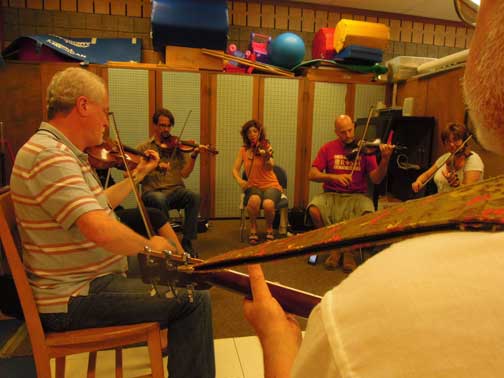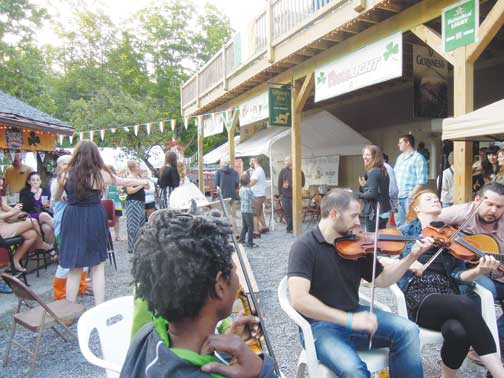


SERVICES
Tuesday August 7, 2012
"One Of The Best Week's There Is!"
Joanie Madden and Cherish the Ladies Gwen Orel Reports Back From This Year's Catskills Irish Arts WeekAs Joanie Madden introduced a whistle tune she'd taught during the week, on Thursday, July 19, during the concert at the Catskills Irish Arts Week, a group of her young students whooped and hollered. They were sitting on the ground, because the chairs near the front were all taken. Some of the kids played air-whistle while Joanie played. It was an image, said Artistic Director Paul Keating, that he would not soon forget. "You always carry away certain images during the week. Cherish the Ladies on Thursday night, not only was it a sensational show, but seeing a bunch of kids in rapt attention watching what was going on: you can't get any better than that. It spoke just to what it was." The image buoyed him. Also lifting him up: the tremendous response to the "Rally Around the Catskills" Kickstarter campaign. When the internet, grass-roots funding appeal was launched on June 23, many people worried that the Catskills Irish Arts Week might not happen at all this year. The goal was $10,000. When the campaign closed on July 15, it had raised $22,580. The money of course is welcome and will be used as a cushion next year, but the quick response, with the goal met in less than a week, was a real vote of confidence and a valentine for Paul's hard work. Donations came from students, from former students, from people who knew they could not attend this year. The campaign showed the love people have for this rustic week in the Catskills, when some of the best Irish players from around the world come to teach and play. The numbers were down a little this year, Paul said, but in the end, not by much. Sliabh Luachra fiddler and teacher Matt Cranitch said that he preferred having a slightly smaller class, because the people who were there seemed really committed to being there. And the lessons learned in classes can go deep. Not so much the tunes: when you learn a tune a day, you are probably going to forget some of them, even though people do practice insanely and hit a lot of sessions when they first return from the week. But bits of technique, a correction here and there. For example, guitar player Paul DeGrae brought his class in accompanying to Matt's Sliabh Luachra class on the last day, and taught a lesson in how NOT to accompany a slide. "The wrong way is to only accent the main beats, which squares off the tune, and turns it into a hornpipe, and nails it to the floor and kills it. It drives me insane," Paul said. He demonstrated the wrong way to do it with Matt, and then played it the right way, strumming it as a jig, just leaving out the second beat. And enjoined all the fiddlers in the room to spread the word. My guess is that they will. Singer Michael Black, of the Black family, was a newcomer to the Catskills. One of the things that struck him, he said, was how young his students were. He was not expecting to have students who were teenagers, and, he said, it rejuvenated him.
Matt Cranitch's class (with Gwen Orel and Paul DeGrae) "We've been trending towards that," Paul Keating said about the serious young students. "People from Ireland are astounded by high level of skill of students here. Their own skills can be translated on top of what they're bringing into it. It's passing on tradition to the younger people." If you did have a chance to take classes you had your pick among some of the best players in the world. There were beloved familiar faces, like Matt Cranitch, and Margie Mulvihill and Rose Flanagan, and newcomers too, including Boys of the Lough's Cathal McConnell, Cape Breton/Newfoundland fiddler Chrissie Crowley, piper Gay McKeown. Jimmy Crowley was teaching bouzouki, and Mairtin de Cogain taught storytelling and bodhrán. Fiddler Bernadette Nic Gabhain taught fiddle and also a class in Irish language. And of course, there was dance, too, from Donny Golden, Kieran Jordan and Padraig McEneany. At the Andy McGann Festival on Saturday, the general public could see sets from all of the teachers. And though the economy has been hard, and not everyone could manage a whole week's vacation to take classes, sessions were as crowded as ever. Fiddler Oisin McCauley came down from Boston for just one night, but made the most of it: he was seen playing at Blackthorne's Resort afterhours as the sky turned pink. Banjo player Pauline Conneely danced with fiddler and 11th Street Bar session host Tony DeMarco. It's almost a mark of honor to be playing in sessions that don't get started until the wee hours. The days beforehand are crammed with activity: from Monday through Friday, there are classes in different instruments all day, lectures at 4, evening concerts by the teachers and other artists and, in the evenings, organized sessions at different levels. Some are intermediate level, some "listening rooms" for the teachers to play together-often people that rarely meet otherwise-some are open sessions. That goes on for two hours, and then at midnight the schedule is over, but the instruments are out. So midnight is often when things get going and, as one of the musicians said from the stage at one of the evening concerts, "1am is the new 6pm." Going to sleep at 3am is an early night. It gets later as the week goes on. Friday night, I left Blackthorne's at 8am I was told from members of her band Chicago Reel the next day that Pauline did not leave until 11. People just don't want to stop. Flutist Catherine McEvoy, about 3 am on Saturday night, kept playing with fiddler Willie Kelly at Shamrock's because, she said, they don't get to play together. Wonderful things happen during daylight hours too, though. Patty Furlong led, for the second time, a slow session daily that played sets from Comhaltas Ceoltóirí Éireann's Foinn Seisiún books.
Sessions at Blackthorne's go until dawn and after The books, Patty explained, are sets of tunes. She would pick sets from one of the different books each day, and play through them twice. "It was not a beginner level session, which people assumed because it was slow. The tunes are intermediate to advanced, put into sets. It opens up your eyes. You need to string the tunes alone." The sessions were extremely well attended, and suggested that there's a great hunger among students to learn complete sets and play them together in a safe environment. Fintan Vallely gave a lecture during the week introducing the second edition of A Companion to Irish Traditional Music. It's a big thick book and an invaluable resource, an encyclopedia with entries on styles, people, performance, instruments, from hundreds of contributors. It's a must for everyone who plays or listens to Irish music, and its website has a searchable index at www.companion.ie Kathleen Biggins, host of WFUV's A Thousand Welcomes, often starts her days with lectures, she said. She emceed one of the concerts. She said she had been there for 14 of the 18 years the week has existed. The week, said Kathleen, is one of the best there is. "I can understand why musicians come here year after year." Gwen Orel runs the blog and podcast New York Irish Arts |
CURRENT ISSUE

RECENT ISSUES


SYNDICATE
[What is this?]
POWERED BY

HOSTED BY

Terms of Service | Privacy Policy
Website Design By C3I








